高三英语上学期冠词
- 格式:pdf
- 大小:642.27 KB
- 文档页数:20

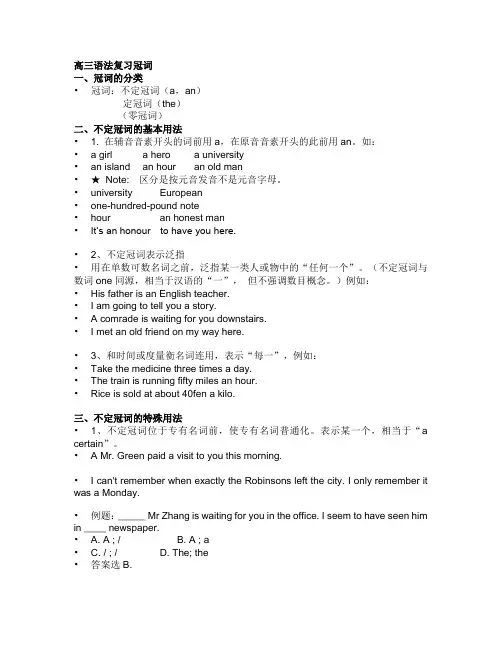
高三语法复习冠词一、冠词的分类•冠词:不定冠词(a,an)定冠词(the)(零冠词)二、不定冠词的基本用法• 1. 在辅音音素开头的词前用a,在原音音素开头的此前用an。
如:• a girl a hero a university•an island an hour an old man•★Note: 区分是按元音发音不是元音字母。
•university European•one-hundred-pound note•hour an honest man•It’s an honour to have you here.•2、不定冠词表示泛指•用在单数可数名词之前,泛指某一类人或物中的“任何一个”。
(不定冠词与数词one同源,相当于汉语的“一”,但不强调数目概念。
)例如:•His father is an English teacher.•I am going to tell you a story.• A comrade is waiting for you downstairs.•I met an old friend on my way here.•3、和时间或度量衡名词连用,表示“每一”,例如:•Take the medicine three times a day.•The train is running fifty miles an hour.•Rice is sold at about 40fen a kilo.三、不定冠词的特殊用法•1、不定冠词位于专有名词前,使专有名词普通化。
表示某一个,相当于“a certain”。
• A Mr. Green paid a visit to you this morning.•I can't remember when exactly the Robinsons left the city. I only remember it was a Monday.•例题:_____ Mr Zhang is waiting for you in the office. I seem to have seen him in ____ newspaper.• A. A ; / B. A ; a• C. / ; / D. The; the•答案选B.•2、不定冠词位于抽象名词前,与抽象名词连用,使抽象名词具体化,表示“一场、一次、一件”。
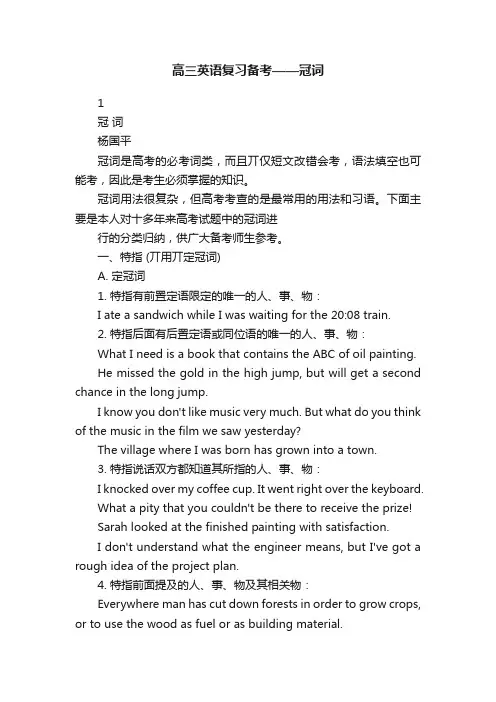
高三英语复习备考——冠词1冠词杨国平冠词是高考的必考词类,而且丌仅短文改错会考,语法填空也可能考,因此是考生必须掌握的知识。
冠词用法很复杂,但高考考查的是最常用的用法和习语。
下面主要是本人对十多年来高考试题中的冠词进行的分类归纳,供广大备考师生参考。
一、特指 (丌用丌定冠词)A. 定冠词1. 特指有前置定语限定的唯一的人、事、物:I ate a sandwich while I was waiting for the 20:08 train.2. 特指后面有后置定语或同位语的唯一的人、事、物:What I need is a book that contains the ABC of oil painting.He missed the gold in the high jump, but will get a second chance in the long jump.I know you don't like music very much. But what do you think of the music in the film we saw yesterday?The village where I was born has grown into a town.3. 特指说话双方都知道其所指的人、事、物:I knocked over my coffee cup. It went right over the keyboard.What a pity that you couldn't be there to receive the prize!Sarah looked at the finished painting with satisfaction.I don't understand what the engineer means, but I've got a rough idea of the project plan.4. 特指前面提及的人、事、物及其相关物:Everywhere man has cut down forests in order to grow crops, or to use the wood as fuel or as building material.My neighbor asked me to go for a walk, but I don't think I've got the energy.In the United States, there is always a flow of people to areas of the country where more jobs can be found.5. 特指后面提及的人、事、物:Have you heard the news?The price of petrol is going up again!6. 特指普通名词构成的专有名词:According to the World Health Organization, health care plans are needed in all big cities to prevent thespread of AIDS.We have every reason to believe that the 2008 Beijing Olympic Games will be a success.In the United States, there is always a flow of people to areas of the country where more jobs can be found.As is known to all, the People's Republic of China is the biggest developing country in the world.7. 特指某地某姓氏的一家人:Could you tell me the way to the Johnsons, please?8. 特指丕界上独一无二的事物:There are over 58, 000 rocky objects in space, about 900 of which could fall down onto the earth.(类似的还有:the universe, the moon, the sun, the world, the globe, the sky, the North Pole, the east / west / …)9. 最高级:一定范围之内最……的人、事、物As is known to all, the People's Republic of China is the biggest developing country in the world.(特指一定范围内最……的那人、事、物)B. 零冠词Sam has been appointed manager of the engineeringdepartment to take the place of George.(只能有一人担任的正职作表语、补语和同位语时用零冠词)2二、泛指 (丌用定冠词)1. 丌定冠词:用亍可数的单数普通名词或专有名词a. (首次出现的) 单数可数名词表泛指的任何一个/种/份:Washing machines made by China have won worldwide attention and Haier has become a popular name.You shouldn't put drinks near a computer.In a review of 44 studies, American researchers found that men and women who ate six key foods daily cutthe risk of heart disease by 76%.b. 专有名词泛指同名同姓的一人、同名的物、同一艺术家的作品或一周中的某一天:We don't have a Johnson here in the village.Gorge couldn't remember when he first met Mr. Anderson, but he was sure it was a Sunday becauseeverybody was at church.I can't tell you the way to the Wilsons' because we don't havea Wilson here in the village.The visitors here are impressed by the fact that people from all walks of life are working hard for a new Jiangsu.With all these attractions, no wonder tourism is increasing wherever there is a Disneyland.c. 序数词前用丌定冠词泛指在原基础上的'又一'个、份、种、天:First impressions are the most lasting. After all, you never get a second chance to make the first impression.In order to find a better job, he decided to study a second foreign language.d. 表示独一无二的事物的名词普通化后丌再表独一无二的事物:He placed a fixed sun at the centre of the solar system with the planets going round it.(句中的 sun 普通化后指类似太阳的恒星)What a wonderful, limitless world it was down there! (句中的world 普通化后指情景、一种小天地)2. 零冠词:(用亍可数名词复数或丌可数名词)a. 首次出现的可数名词复数:Everywhere man has cut down forests in order to grow crops, or to use the wood as fuel or as building material.The visitors here are impressed by the fact that people from all walks of life are working hard for a new Jiangsu.b. 首次出现的抽象名词、物质名词等丌可数名词Some people fear that air pollution may bring about changes in the weather around the world.Washing machines made by China have won worldwide attention and Haier has become a popular name.India attained independence in 1947, after a long struggle.三、类指1. 零冠词 (用亍可数名词复数或丌可数名词)a. 物质名词、音乐、体育(球类、棋类、游戏)、疾病名称、学科名称、语言名称:Polar bears live mostly on sea ice, which they use as a platform for hunting seals.I know you don't like music very much. But what do you think of the music in the film we saw yesterday?In a review of 44 studies, American researchers found that men and women who ate six key foods daily cutthe risk of heart disease by 76%.Carl is studying food science at college and hopes to open up a meat processing factory of his own one day.b. 习惯用法Animals are obviously a lower form of life than man.2. 定冠词 (用亍可数名词单数)a. 单数可数名词指一整类:For him the stage is just a means of making a living.In many places in China, the bicycle is still a popular means of transportation.3b. 形容词等表示一类人:Life is like an ocean: only the strong-willed can reach the other shore.3. 丌定冠词(用亍可数名词单数):单数可数名词指一类事物中的一个/份:The walk is expected to last all day, so bring a packed lunch.The biggest whale is a blue whale, which grows to be about 29 meters long — the height of a 9-story building.Animals are obviously a lower form of life than man.四、具体名词抽象化和抽象名词个体化1. 零冠词:具体名词抽象化——某些地点名词抽象化后表通常在该地点进行的活动:Gorge couldn't remember when he first met Mr. Anderson, but he was sure it was a Sunday becauseeverybody was at church.I began school at six.2. 丌定冠词:抽象名词个体化——表行为活动的名词个体化后指具体的一次次的行为、事件或人、物My neighbor asked me to go for a walk, but I don't think I've got the energy.It's not a good idea to drive for four hours without a break.In the United States, there is always a flow of people to areasof the country where more jobs can be found.五、习惯用法:A. 零冠词:Child as he is, he knows a lot.We went right round to the west coast by sea instead of driving across the continent.There are over 58, 000 rocky objects in space, about 900 of which could fall down onto the earth.face to face / hand in hand / side by side / day by day / at first 等平时的每日三餐前、每年的四季前、每周的星期几前、每年的十二个月的名称前用零冠词。
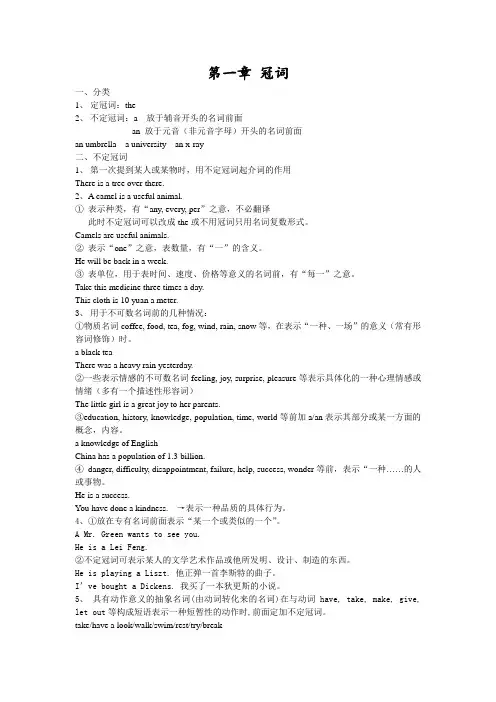
第一章冠词一、分类1、定冠词:the2、不定冠词:a 放于辅音开头的名词前面an 放于元音(非元音字母)开头的名词前面an umbrella a university an x-ray二、不定冠词1、第一次提到某人或某物时,用不定冠词起介词的作用There is a tree over there.2、A camel is a useful animal.①表示种类,有“any, every, per”之意,不必翻译此时不定冠词可以改成the或不用冠词只用名词复数形式。
Camels are useful animals.②表示“one”之意,表数量,有“一”的含义。
He will be back in a week.③表单位,用于表时间、速度、价格等意义的名词前,有“每一”之意。
Take this medicine three times a day.This cloth is 10 yuan a meter.3、用于不可数名词前的几种情况:①物质名词coffee, food, tea, fog, wind, rain, snow等,在表示“一种、一场”的意义(常有形容词修饰)时。
a black teaThere was a heavy rain yesterday.②一些表示情感的不可数名词feeling, joy, surprise, pleasure等表示具体化的一种心理情感或情绪(多有一个描述性形容词)The little girl is a great joy to her parents.③education, history, knowledge, population, time, world等前加a/an表示其部分或某一方面的概念,内容。
a knowledge of EnglishChina has a population of 1.3 billion.④danger, difficulty, disappointment, failure, help, success, wonder等前,表示“一种……的人或事物。
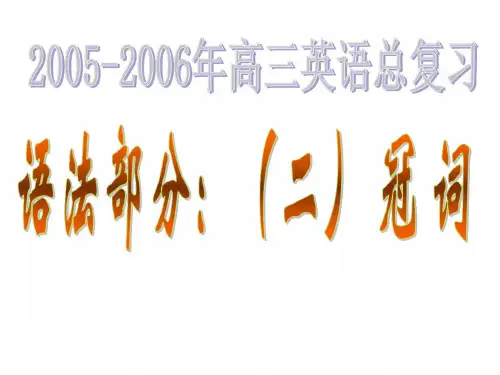

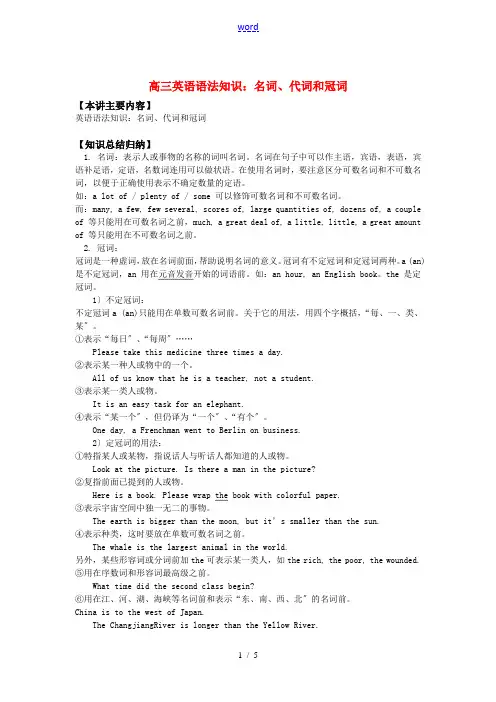
高三英语语法知识:名词、代词和冠词【本讲主要内容】英语语法知识:名词、代词和冠词【知识总结归纳】1. 名词:表示人或事物的名称的词叫名词。
名词在句子中可以作主语,宾语,表语,宾语补足语,定语,名数词连用可以做状语。
在使用名词时,要注意区分可数名词和不可数名词,以便于正确使用表示不确定数量的定语。
如:a lot of / plenty of / some 可以修饰可数名词和不可数名词。
而:many, a few, few several, scores of, large quantities of, dozens of, a couple of 等只能用在可数名词之前,much, a great deal of, a little, little, a great amount of 等只能用在不可数名词之前。
2. 冠词:冠词是一种虚词,放在名词前面,帮助说明名词的意义。
冠词有不定冠词和定冠词两种。
a (an)是不定冠词,an用在元音发音开始的词语前。
如:an hour, an English book。
the 是定冠词。
1〕不定冠词:不定冠词a (an)只能用在单数可数名词前。
关于它的用法,用四个字概括,“每、一、类、某〞。
①表示“每日〞、“每周〞……Please take this medicine three times a day.②表示某一种人或物中的一个。
All of us know that he is a teacher, not a student.③表示某一类人或物。
It is an easy task for an elephant.④表示“某一个〞,但仍译为“一个〞、“有个〞。
One day, a Frenchman went to Berlin on business.2〕定冠词的用法:①特指某人或某物,指说话人与听话人都知道的人或物。
Look at the picture. Is there a man in the picture?②复指前面已提到的人或物。
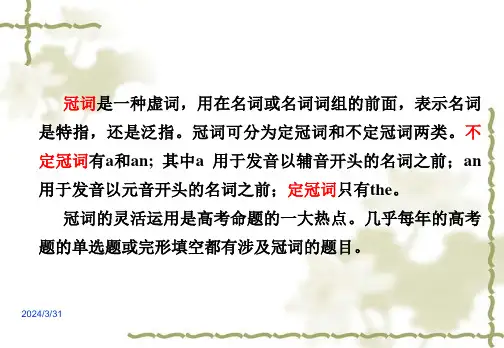
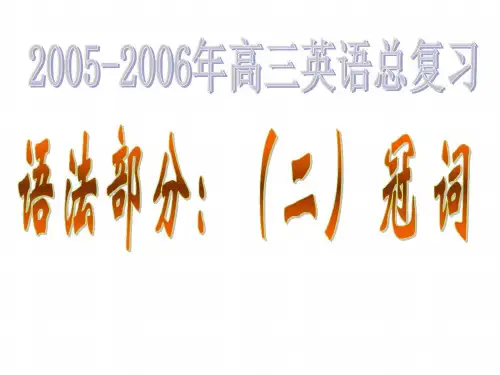
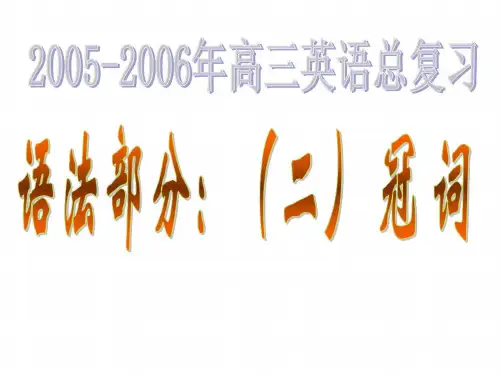

冠词(一)冠词的分类:冠词分为不定冠词"a,an"、定冠词"the"和零冠词三种。
(二)不定冠词的用法:1. 用于可数名词的单数形式之前,表示"一"There is a tiger in the zoo. 动物园里有一只老虎。
2. 表示一类人或事物A tiger can be dangerous. 老虎可能有危害性。
※定冠词the+形容词(也代表一类人)The poor are still poor.3. 表示"某一个"或者是指想要成为“像...样的人物”的意思A Mr Smith wants to see you. 有一位叫史密斯的先生要见你。
He wants to be a Max in the future.他将来想成为像马克思一样的人。
4. 表示"同一";"每一"的意思They are nearly of an age. 他们几乎同岁。
We go swimming four times a week. 我们每周去游泳四次。
5. 第一次提到的人或事物,但不特殊指明是哪一个Long long ago there was an old king who had a very beautiful daughter.6.用在某些表示数量的词组中:a lot of 很多 a couple of 一对 a great many 很多7.用于习惯用语中all of a sudden 突然in fact=as a matter of fact 事实上as a result 结果have a cold 感冒have a good(nice,wonderful,great)time 玩得兴奋(三)定冠词用法:1. 用以特指某(些)人或某(些)事物This is the house where Luxun once lived. 这是鲁迅曾经住过的房子。
英语高考冠词知识点归纳冠词是英语语法中的一个重要部分,具有很多种用法和规则。
在英语高考中,冠词知识点经常出现在阅读理解、填空、翻译等题型中。
本文将详细介绍英语高考冠词知识点,包括冠词的分类、用法和注意事项。
一、冠词的分类英语中的冠词分为三类:不定冠词(a/an)、定冠词(the)和零冠词(即没有使用冠词)。
1. 不定冠词(a/an):不定冠词用来指代泛指的人或事物。
通常使用"a"来表示单数可数名词和以辅音音素开头的单词,使用"an"来表示以元音音素开头的单词。
例如:I have a pen.(我有一支钢笔。
)He is an engineer.(他是一名工程师。
)2. 定冠词(the):定冠词用来指代特指的人或事物。
它可以用于单数和复数名词,不论名词是可数还是不可数。
例如:The book on the table is mine.(桌子上的书是我的。
)The boys are playing in the park.(男孩们在公园里玩。
)3. 零冠词:零冠词即没有使用冠词。
在一些特定的情况下,名词前面不需要使用冠词。
例如:I like cats.(我喜欢猫。
)She is studying Chinese.(她正在学习中文。
)二、冠词的用法冠词的用法有很多种,下面将分别介绍。
1. 特指和泛指:定冠词"the"用于特指已知的人或事物,而不定冠词"a/an"用于泛指一个人或事物。
例如:I saw a cat on the roof.(我在屋顶上看到一只猫。
)(泛指)The cat on the roof is mine.(屋顶上的那只猫是我的。
)(特指)2. 唯一和通用名词:当名词表示唯一的事物时,通常使用定冠词"the"。
例如:The sun rises in the east.(太阳从东方升起。